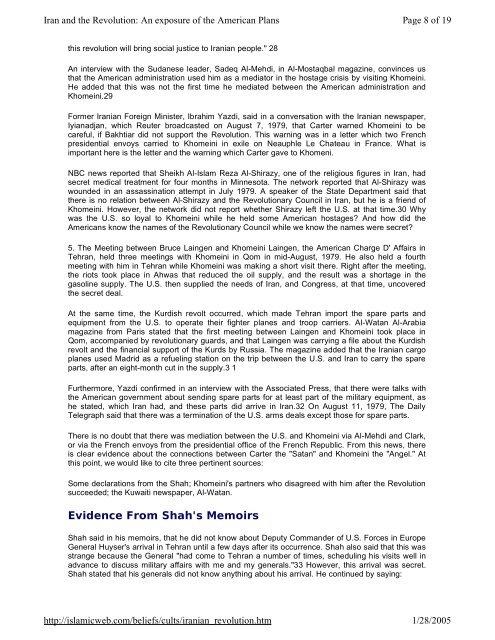Collection Of Articles (Refuting Shia) - Enjoy Islam
Collection Of Articles (Refuting Shia) - Enjoy Islam
Collection Of Articles (Refuting Shia) - Enjoy Islam
Create successful ePaper yourself
Turn your PDF publications into a flip-book with our unique Google optimized e-Paper software.
Iran and the Revolution: An exposure of the American Plans<br />
Page 8 of 19<br />
this revolution will bring social justice to Iranian people." 28<br />
An interview with the Sudanese leader, Sadeq Al-Mehdi, in Al-Mostaqbal magazine, convinces us<br />
that the American administration used him as a mediator in the hostage crisis by visiting Khomeini.<br />
He added that this was not the first time he mediated between the American administration and<br />
Khomeini.29<br />
Former Iranian Foreign Minister, Ibrahim Yazdi, said in a conversation with the Iranian newspaper,<br />
Iyianadjan, which Reuter broadcasted on August 7, 1979, that Carter warned Khomeini to be<br />
careful, if Bakhtiar did not support the Revolution. This warning was in a letter which two French<br />
presidential envoys carried to Khomeini in exile on Neauphle Le Chateau in France. What is<br />
important here is the letter and the warning which Carter gave to Khomeni.<br />
NBC news reported that Sheikh Al-<strong>Islam</strong> Reza Al-Shirazy, one of the religious figures in Iran, had<br />
secret medical treatment for four months in Minnesota. The network reported that Al-Shirazy was<br />
wounded in an assassination attempt in July 1979. A speaker of the State Department said that<br />
there is no relation between Al-Shirazy and the Revolutionary Council in Iran, but he is a friend of<br />
Khomeini. However, the network did not report whether Shirazy left the U.S. at that time.30 Why<br />
was the U.S. so loyal to Khomeini while he held some American hostages And how did the<br />
Americans know the names of the Revolutionary Council while we know the names were secret<br />
5. The Meeting between Bruce Laingen and Khomeini Laingen, the American Charge D' Affairs in<br />
Tehran, held three meetings with Khomeini in Qom in mid-August, 1979. He also held a fourth<br />
meeting with him in Tehran while Khomeini was making a short visit there. Right after the meeting,<br />
the riots took place in Ahwas that reduced the oil supply, and the result was a shortage in the<br />
gasoline supply. The U.S. then supplied the needs of Iran, and Congress, at that time, uncovered<br />
the secret deal.<br />
At the same time, the Kurdish revolt occurred, which made Tehran import the spare parts and<br />
equipment from the U.S. to operate their fighter planes and troop carriers. Al-Watan Al-Arabia<br />
magazine from Paris stated that the first meeting between Laingen and Khomeini took place in<br />
Qom, accompanied by revolutionary guards, and that Laingen was carrying a file about the Kurdish<br />
revolt and the financial support of the Kurds by Russia. The magazine added that the Iranian cargo<br />
planes used Madrid as a refueling station on the trip between the U.S. and Iran to carry the spare<br />
parts, after an eight-month cut in the supply.3 1<br />
Furthermore, Yazdi confirmed in an interview with the Associated Press, that there were talks with<br />
the American government about sending spare parts for at least part of the military equipment, as<br />
he stated, which Iran had, and these parts did arrive in Iran.32 On August 11, 1979, The Daily<br />
Telegraph said that there was a termination of the U.S. arms deals except those for spare parts.<br />
There is no doubt that there was mediation between the U.S. and Khomeini via Al-Mehdi and Clark,<br />
or via the French envoys from the presidential office of the French Republic. From this news, there<br />
is clear evidence about the connections between Carter the "Satan" and Khomeini the "Angel." At<br />
this point, we would like to cite three pertinent sources:<br />
Some declarations from the Shah; Khomeini's partners who disagreed with him after the Revolution<br />
succeeded; the Kuwaiti newspaper, Al-Watan.<br />
Evidence From Shah's Memoirs<br />
Shah said in his memoirs, that he did not know about Deputy Commander of U.S. Forces in Europe<br />
General Huyser's arrival in Tehran until a few days after its occurrence. Shah also said that this was<br />
strange because the General "had come to Tehran a number of times, scheduling his visits well in<br />
advance to discuss military affairs with me and my generals."33 However, this arrival was secret.<br />
Shah stated that his generals did not know anything about his arrival. He continued by saying:<br />
http://islamicweb.com/beliefs/cults/iranian_revolution.htm<br />
1/28/2005
















